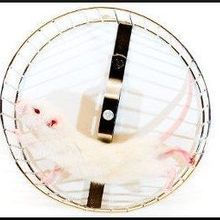cognitive science

Are You Smarter Than Your Dog?
The Scientist | Jan 11, 2021 | 1 min read
Check out the optical illusion that researchers put before canines, finding that fido and master have opposite reactions.

A Dog’s View of Optical Illusions
Catherine Offord | Jan 1, 2021 | 10 min read
Researchers are using visual tricks to try to better understand canine perception.

Contributors
Aggie Mika | Oct 1, 2017 | 3 min read
Meet some of the people featured in the October 2017 issue of The Scientist.

Pigeons Can Switch Tasks More Quickly than Humans
Jef Akst | Sep 27, 2017 | 2 min read
The birds’ ability to multitask may be attributable to a more densely packed cerebral cortex, scientists propose.

How Microbes May Influence Our Behavior
Amy Lewis | Sep 1, 2017 | 4 min read
Researchers are piecing together the links between the gut microbiome and mental health.

Rats that Run Have Better Memory
Jef Akst | Aug 14, 2017 | 3 min read
Male rodents given access to a running wheel early in life show increased neural activity and improved memory as adults.

Mysterious Brain Waves May Connect REM Sleep with Visual Experiences
Phil Jaekl | Jul 16, 2017 | 3 min read
New methods could propel investigation of neural “PGO” wave patterns that may underlie critical aspects of visual experience, dreaming, and even psychosis.

The Evolutionary Roots of Instinct
Becca Cudmore | Jul 16, 2017 | 4 min read
Did behaviors that seem ingrained become fixed through epigenetic mechanisms and ancestral learning?

Human Cord Plasma Protein Boosts Cognitive Function in Older Mice
Abby Olena, PhD | Apr 19, 2017 | 3 min read
A protein found in human umbilical cord plasma improves synaptic plasticity, learning, and memory in aged mice.

Understanding the Connection Between Synesthesia and Absolute Pitch
Catherine Offord | Mar 1, 2017 | 4 min read
Researchers investigate the unusual association of musical sounds with tastes or colors through the lens of another perceptual quirk.

John Iversen Explores our Perception of Musical Rhythm
Vijay Shankar Balakrishnan | Mar 1, 2017 | 3 min read
At the Swartz Center for Computational Neuroscience at the University of California, San Diego, the researcher studies the neurobiology of music perception.

Meeting BRAMS
The Scientist | Feb 28, 2017 | 1 min read
Visit the International Laboratory for Brain, Music and Sound Research, located in Montreal, to see the research seeking to decipher humans’ relationship to music.

Birds Have Skills Previously Described as “Uniquely Human”
Jef Akst | Dec 1, 2016 | 3 min read
Scientists are enlisting the help of pigeons, parrots, crows, jays, and other species to disprove the notion that human cognitive abilities are beyond those of other animals.

Slideshow: Nerdy Birdies
The Scientist | Nov 30, 2016 | 1 min read
Meet the pigeons that are redefining what it means to behave like a human by displaying remarkable pattern recognition abilities.

Notable Science Quotes
The Scientist | Oct 1, 2016 | 2 min read
Roger Tsien R.I.P., predatory publishing, and diversity in science

How Type 2 Diabetes Affects the Brain
Mallory Locklear | Jul 20, 2016 | 3 min read
The results of studies on humans and zebrafish suggest how hyperglycemia can cause cognitive deficits.

Study: Influence of Genetics on Mental Health Depends on Environment
Tanya Lewis | Jul 20, 2016 | 2 min read
The same genes can make people more sensitive to their experiences, “for better of for worse,” psychologists argue.

Book Excerpt from Wondrous Truths
J.D. Trout | May 31, 2016 | 4 min read
In Chapter 2 author J.D. Trout highlights the dividing line between truth and scientific “fact.”

To Each Animal Its Own Cognition
Frans de Waal | May 1, 2016 | 3 min read
The study of nonhuman intelligence is coming into its own as researchers realize the unique contexts in which distinct species learn and behave.
